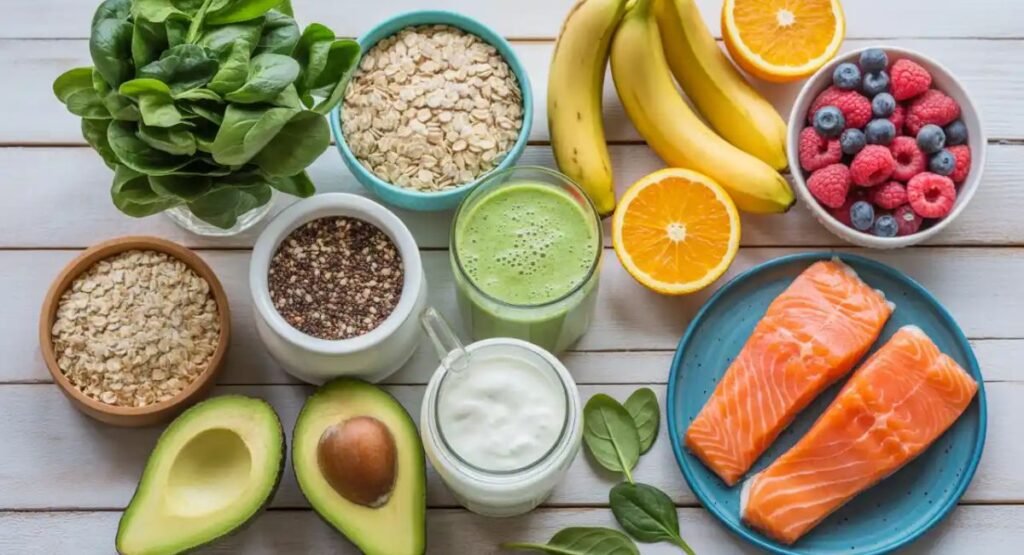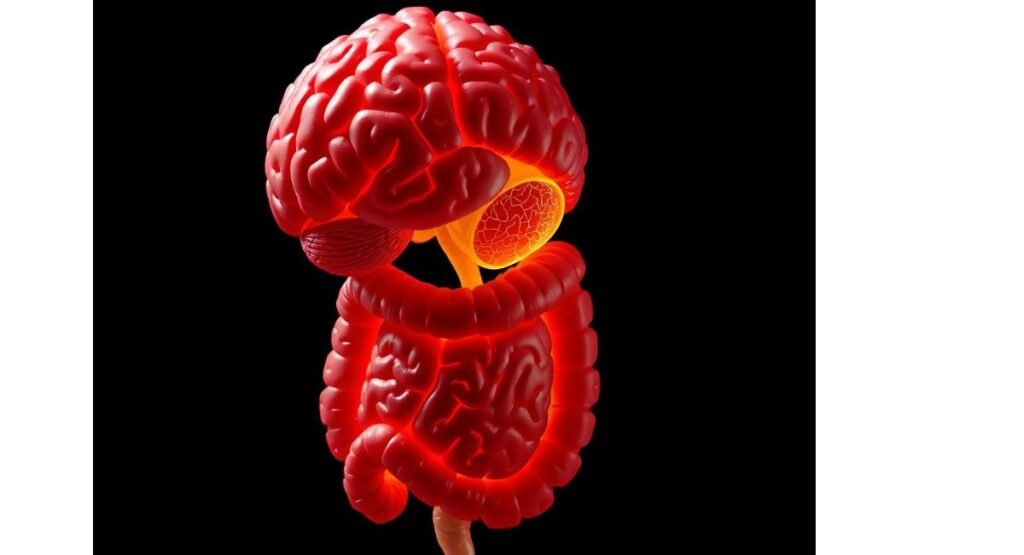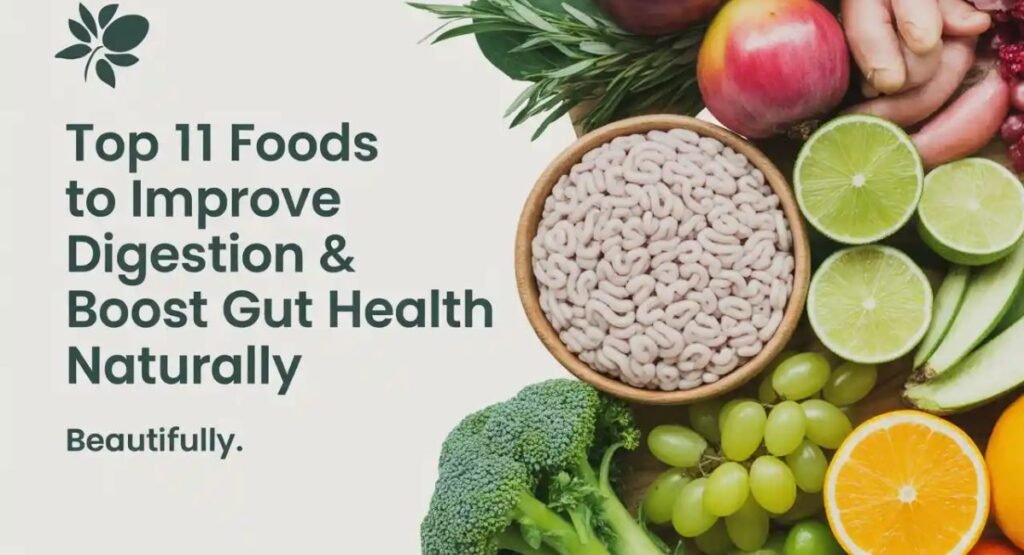Introduction
A healthy gut is the cornerstone of overall wellness, and what you eat plays a crucial role in keeping it balanced. If you often feel bloated, sluggish, or uncomfortable after meals, your digestive system might be crying out for help. The good news? Nature offers plenty of delicious options to restore your gut’s harmony.
In this guide, we’ll uncover the top 11 foods to improve digestion and boost gut health naturally—foods that not only soothe the stomach but also enhance nutrient absorption and support your immune system. Say goodbye to digestive discomfort and hello to a lighter, healthier you—one gut-friendly bite at a time. Let your gut thrive, starting with your next meal.

Why Digestive Health Matters More Than You Think
Your gut is more than just a food processor. It’s home to trillions of gut bacteria that affect how you feel and function. A balanced microbiome helps control immune cells, reduce inflammation, and protect your body from harmful toxins. Poor gut balance, on the other hand, can lead to serious gastrointestinal symptoms and even chronic illnesses.
In the United States, irritable bowel syndrome (IBS) affects nearly 15% of the adult population. That’s millions of people suffering from bloating and gas, cramping, and irregular bowel movements. The good news? Your diet plays a big role in how your digestive system performs. Supporting your gut health with the right food can be a game changer.
The Brain-Gut Connection: How Your Gut Affects Mood & Mind
Ever felt butterflies before a big decision? That’s your brain-gut connection in action. Scientists now call the gut our “second brain” because it’s closely linked to how we think, feel, and react. Your gut produces nearly 90% of the body’s serotonin—a hormone that controls mood and happiness.
When your colon bacteria are in balance, your brain works better. When they’re not, you may feel anxious, moody, or even depressed. What you eat doesn’t just feed your body—it also feeds your thoughts. That’s why foods that support gut health also support mental well-being.
Whole Grains: Fuel for Smooth Digestion
Whole grains like oats, brown rice, quinoa, and whole wheat are excellent for fiber intake. They’re rich in nutrients like omega-3 fatty acids and create short-chain fatty acids when fermented by good gut bacteria. These acids help your colon function and improve your immune cells.
Avoiding grains may hurt your microbiome in the long run. Low-carb diets can starve your gut bacteria. Instead, include colon-friendly foods like whole grains to maintain balance. Here’s a quick comparison:
| Type of Grain | Fiber per 100g | Benefit |
| Brown Rice | 1.8g | Supports smooth digestion |
| Oats | 10g | Helps lower bad cholesterol |
| Quinoa | 2.8g | Gluten-free & rich in protein |
| Whole Wheat Bread | 7g | Boosts fiber intake |

Leafy Greens: Nature’s Gut Cleanser
Dark leafy greens like spinach, kale, and chard provide prebiotic fiber, inulin, and plant-based compounds that feed good gut bacteria. A daily spinach smoothie can help you increase your fiber intake and protect your colon health.
These greens are rich in folate, vitamin A, and vitamin K. They also contain a special sugar that strengthens the gut bacteria lining. In other words, leafy greens act like a gentle broom, sweeping through your digestive system and helping your healthy digestion thrive.
Low-Fructose Fruits That Keep Bloating Away
Many Americans don’t realize that some fruits worsen gastrointestinal symptoms. Apples and mangoes are high in fructose, which may lead to bloating and gas in sensitive people. Low-fructose fruits like bananas, oranges, kiwis, and berries are easier on your gut.
These fruits also contain inulin and help feed healthy gut flora. They’re easy to digest and give your body natural sweetness without irritation. Bananas, in particular, are a great source of digestive enzymes and soluble fiber.
Avocado: Healthy Fats That Heal the Gut Lining
Avocado is loaded with omega-3 fatty acids and prebiotic fiber, making it ideal for gut health. Its creamy texture supports the healing of the intestinal lining and improves colon function.
The fats in avocado are anti-inflammatory and support the growth of good gut bacteria. Just one avocado a day provides nearly 10 g of fiber, making it one of the best colon-friendly foods to include in your meals regularly.
Lean Proteins: Easy-to-Digest Energy Sources
Not all proteins are created equal. Lean proteins like chicken, turkey, eggs, and fish are easier to digest than red meats. Many people with IBS or other gastrointestinal symptoms benefit from switching to red meat alternatives.
Unlike high-fat meats, these options reduce inflammation in the digestive system and don’t disrupt your gut bacteria. They also support muscle repair without putting extra pressure on your colon function. If you have a sensitive stomach, choosing lean protein is a smart and gentle choice.
Probiotic-Rich Foods to Rebuild Gut Flora
Fermented foods like yogurt, kefir, sauerkraut, miso, and kimchi are packed with probiotic-rich cultures. These introduce healthy gut flora into your system and can rebalance your microbiome after antibiotics or stress.
Adding these foods to your meals supports digestive enzymes and helps reduce bloating and gas. In fact, studies show that probiotics can ease symptoms of IBS in just a few weeks. Just one serving a day can improve your gut health significantly.

Prebiotics: Feeding the Good Bacteria in Your Gut
While probiotics bring bacteria in, prebiotics feed the ones already living inside your gut. Foods like onions, garlic, leeks, and asparagus contain inulin, which supports the growth of good gut bacteria.
Prebiotics also increase the production of short-chain fatty acids, which strengthen your immune cells and reduce inflammation in the digestive system. Think of prebiotic fiber as the fertilizer for your gut garden.
Quick Gut-Friendly Recipes You Can Make at Home
Healthy food doesn’t have to be boring. You can easily create high-fiber recipes using the 11 foods above. Here are a few gut-loving ideas:
| Recipe Name | Key Ingredients | Gut Benefit |
| Spinach Smoothie Bowl | Spinach, banana, kefir, chia seeds | Full of fiber intake & probiotics |
| Miso Salmon Bowl | Miso, brown rice, salmon, avocado | Combines lean protein & probiotics |
| Overnight Oats | Oats, Greek yogurt, berries, flaxseeds | Supports healthy digestion |
These meals are quick, tasty, and packed with digestive enzymes, prebiotic fiber, and healthy gut flora.

Conclusion: Heal Your Gut, One Bite at a Time
Improving your digestion starts with your plate. By choosing whole grains, leafy greens, low-fructose fruits, and lean protein, you can nourish your gut health naturally. These 11 foods are more than meals—they are medicine for your digestive system.
Ready to feel lighter, more energetic, and more balanced? Start by adding just one of these colon-friendly foods to your next meal. Your gut bacteria will thank you—and so will your mind and mood.
FAQs
What to drink after a meal to help digestion:
Sip on warm water, herbal teas like peppermint or ginger, or fennel water to soothe digestion and reduce bloating.
How to improve digestion naturally at home:
Eat slowly, stay hydrated, include fiber-rich foods, and use natural aids like probiotics or apple cider vinegar before meals.
Worst foods for gut health:
Processed foods, artificial sweeteners, fried items, and excessive sugar disrupt gut bacteria and cause inflammation.
How to keep your stomach healthy and clean:
Stay hydrated, eat plenty of fruits and vegetables, avoid junk food, and add fermented foods for a balanced gut flora.
Foods good for digestion and bloating:
Yogurt, bananas, papaya, ginger, oats, and fennel are excellent for easing bloating and boosting digestive health.




Pingback: 22 High-Fiber Foods That Boost Health And Digestion -
Pingback: How Your Gut Affects Your Mood and Mental Health